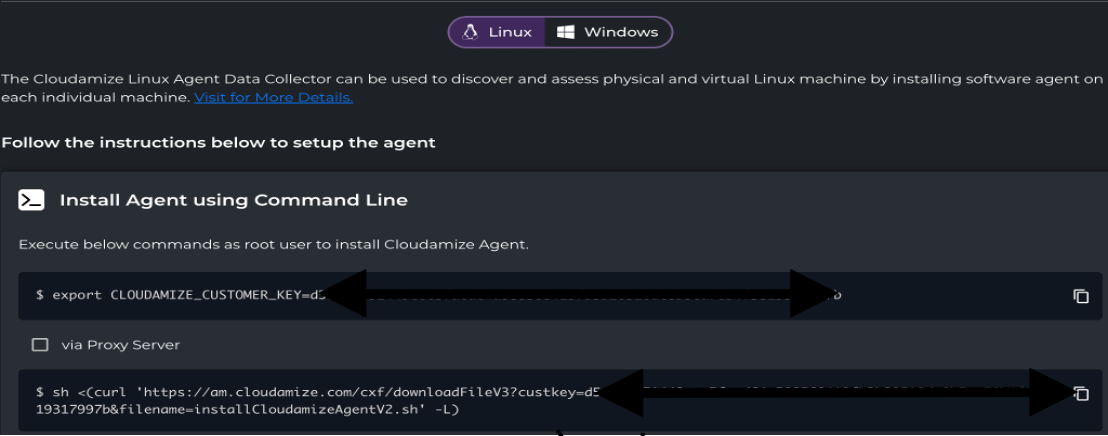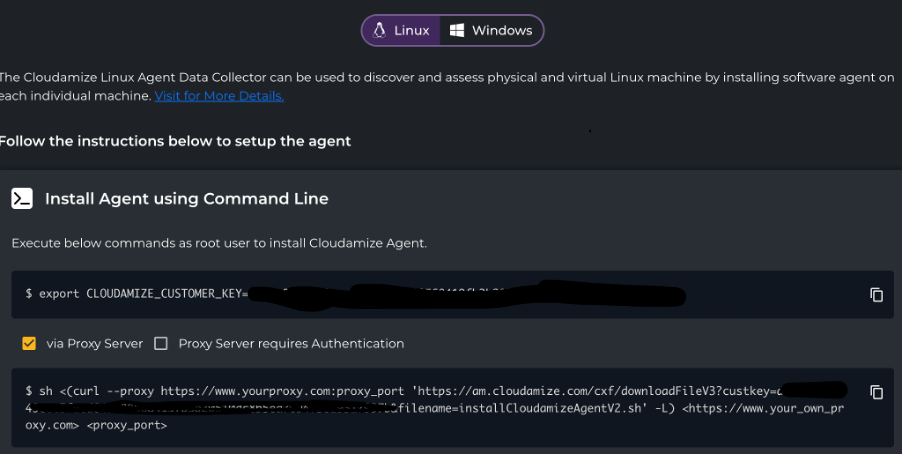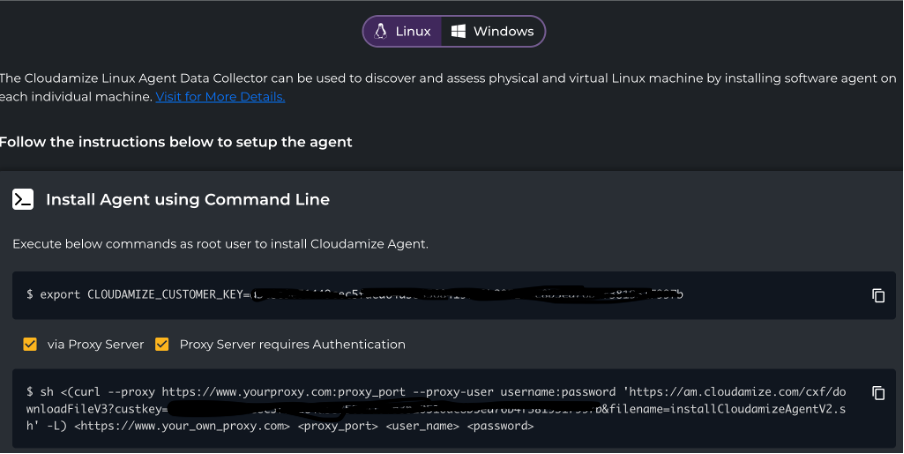Linux Agent - Installation Instructions
Prerequisites:
One of the following OSes (https://support.cloudamize.com/kb/supported-operating-systems-and-chipsets#SupportedOperatingSystemsandChipsets-ListofSupportedLinuxOSs):
Red Hat Enterprise Linux Server release 7.0 or higher
Oracle Linux 6.5 or higher
Ubuntu 16.04 or higher
CentOS release 7 or higher
Debian GNU/Linux 8.0 or higher
Amazon Linux AMI release 2013.03 or higher
Fedora release 12 or higher
Suse Linux 11 or higher
A supported version of OpenSSL
Root and/or Wheel Group access
350 MB persistent storage
The Install script requires curl to retrieve content and to test/verify access to our data collection servers.
Open firewall port TCP 443 to our data collection servers at am.cloudamize.com for US infrastructure, am-de.cloudamize.com for EU infrastructure, or am-ae.cloudamize.com for UAE infrastructure either directly or through a corporate proxy.
If your system locally caches DNS resolution, you may need to resolve am.cloudamize.com to 35.171.170.26 or am-de.cloudamize.com to 18.194.12.63 to allow egress traffic. This will not be the address traffic will return from, so this cannot be used as a firewall exception alone. This feature is not currently available for our UAE collection endpoint.
The Cloudamize Linux Agents are designed exclusively to support the x64 machine architecture.
This means the agents do not support other architectures, including AArch64 (ARM64), ARM32,“
Note: The Linux agent/agentless approach requires a user with root permissions to get PID-to-network mapping, certain hardware details, and data on logical/physical disk volumes. Become a root user either through "sudo -s" or "su"; most systems use sudo.
Procedure (default install method):
Log in to your Cloudamize console here, or launch the application from your Partner Dashboard if you have one.
Navigate to the Discover section on the console portal. Click the Setup tab on the left-hand side, navigate to Agent Setup, then select the Linux tab.
Note: the commands below represent our US infrastructure. If you use our EU infrastructure, copy and paste the commands directly from your assessment.
Step 1: Export your customer key.
export CLOUDAMIZE_CUSTOMER_KEY=<YOUR CUSTOMER KEY>Step 2: Execute the command listed in the assessment portal as root, eg:
$ sh <(curl 'https://am.cloudamize.com/cxf/downloadFileV3?custkey=<YOUR CUSTOMER KEY>&filename=installCloudamizeAgentV2.sh' -L)The command does not work with sudo. If sudo must be used, it can be restructured like:
curl 'https://am.cloudamize.com/cxf/downloadFileV3?custkey=<YOUR CUSTOMER KEY>&filename=installCloudamizeAgentV2.sh' -L | sudo -E bash
If you prefer to route the data through your own proxy server, check the box shown in the image below and use the commands provided in the console at http://console.cloudamize.com . The portal includes the necessary commands under the Assessments section.
Linux Install with Proxy
The agent can be configured to use a proxy. You will need to provide the proxy information both to the download application (curl) and as parameters to the installer script, as shown below.
Take care to use the correct type of proxy prefix - http vs https. Most proxies are http proxies - this does not mean they cannot handle https traffic, as they will pass the encrypted traffic through if allowed. HTTPS proxies are generally security appliances that are used to inspect encrypted traffic prior to leaving the network. Connecting to a http proxy with the https:// prefix will result in failure.

Linux Install with Authenticated Proxy

Deploy from Central Repository:
If each machine downloading the agent is not desired, one of the following offline installers can be used. This is particularly useful for machines that have older OpenSSL installations, as these packages contain an up-to-date curl/openssl application that can communicate with our servers.
You must decide whether to use RPM or DEB, but in general, RPMs are used by Red Hat, CentOS, SUSE, and Oracle Linux, and DEB is used by Debian and Ubuntu. A tgz archive is also available that contains all files necessary to install the agent and can be used for any supported linux distribution.
Download:
Install:
The RPM/DEB/TGZ packages accept the same environment variables for configuration as the installer script. The “CLOUDAMIZE_CUSTOMER_KEY” variable must be set during the install for proper configuration, otherwise the agent must be configured later.
Proxy settings can be set via environment variables. If for some reason environment variables cannot be used during the installation, please see “Configuring the Agent” below.
All installation methods require root access. If using sudo, please take care to ensure the environment variable is set (the easiest method being to use the -E flag of sudo).
Configuring the Agent
The agent can be configured while installed or after it is installed. The following environment variables can be used to configure during installation or when running the configure script: /usr/local/cloudamize/bin/configure.sh
The install.sh and configure.sh scripts can use command line options instead of environment variables, if desired.
An example configuration via command option:
sudo /usr/local/cloudamize/bin/configure.sh --customer-key <cust-key>Example configuration via environment variables:
export CLOUDAMIZE_CUSTOMER_KEY=<cust-key>
sudo -E /usr/local/cloudamize/bin/configure.shAvailable options are:
Env Variable | Parameter* | Description |
|---|---|---|
CLOUDAMIZE_CUSTOMER_KEY | --customer-key <cust-key> | REQUIRED. The customer key to register with. |
PROXY_SERVER | --proxy-server <proxy> | Customer proxy server address to use with curl. |
PROXY_PORT | --proxy-port <port> | Customer proxy port. |
PROXY_UNAME | --proxy-user <user> | Customer proxy user name. |
PROXY_PSWD | --proxy-pass <pass> | Customer proxy user password. |
SERVER_IP | --server-ip <ip> | The Cloudamize server to connect to. Must also specify DNS. |
SERVER_DOMAIN_NAME | --server-dns <dns> | The Cloudamize server to connect to. Must also specify IP. |
USE_INSECURE_CURL=1 | --insecure-curl | Adds “-k” option to all curl commands to ignore certificate verification problems. |
PREFER_SYS_CURL=1 | --prefer-sys-curl | Attempts to connect using curl installed on the system first instead of the cloudamize-packaged curl. |
REGISTER_IMMEDIATELY=1 | --register | TGZ or Script only. This will cause registration to occur during the installation and fail if registration is not successful. |
NO_ORACLE_DB=1 | --no-oracle-db | Does not collect Oracle Database information (no connecting to databases) |
NO_CMD_COLLECTION=1 | --no-command-collection | Does not collect process command lines |
NO_NET_COLLECTION=1 | --no-network-collection | Does not collect network connections |
NO_DOCKER_COLLECTION=1 | --no-docker-collection | Does not collect docker information |
NO_DATA_MIGRATION=1 | --no-data-migration | Disables ability to remotely install data migration agents like AWS MGN and Azure ASR. |
* Parameters are only for installCloudamizeAgentV2.sh and configure.sh
Click here for steps to troubleshoot installation issues.
Click here for instructions on how to uninstall the Linux agents.
